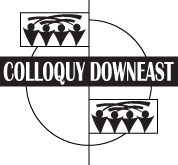How to Build a House
| |||||||
Building a new house or renovating an existing house is a long held dream for many people. This has always been a pretty complex undertaking, but with the post-Covid pandemic inflation it seems even more daunting. (Almost) retired architect, Robert Knight, offers to lead a conversation exploring aspects of building or renovating a home here on the Blue Hill and Deer Isle peninsula. He will ask contractors to join the colloquy and will keep the focus on the practicalities of actually getting something built, whether with an architect or not.
The four sessions are structured to cover the building process from idea to completion. The first two sessions will be on getting drawings and plans in hand. The third session will focus on the building process itself. How do you find and hire a builder? What to expect in terms of process, time, and costs. Dangers, pitfalls, and fun. In the fourth session the plan is to visit one or two houses in the area—with the clients and the builder, or if this is impractical, there will be a discussion with builders on completing the project.
Robert Knight received a Master of Architecture from Yale in 1970. He worked as a carpenter in Washington County Maine in the early 70s, and then in Santa Monica California. He and his wife, Lucia del Sol and two young boys then moved to Blue Hill, Maine.
Licensed as an architect in 1977, Bob started an office in Blue Hill (Knight Associates) where he designed new houses and renovations for 40+years. He is a member of the Maine Chapter of the American Institute of Architects, and was its chapter President in 1985. He taught at UCLA, Cal Poly, and College of the Atlantic. Bob has worked on about 220 new houses and a similar number of renovations in that time.
Bob is retired now, working on his last house! See more on his web site:
www.knightarchitect.com
Before the first session Bob will inquire from those who are signed up whether you are interested more in design issues or building process issues and attempt to structure the discussions around the dominant interest.
Syllabus/Reading
This will largely be a discussion group on building, but for those interested in house design, these three books should be fun to read and are easy to get on line:
The Place of Houses, by Charles W. Moore. Published in 1972 it essentially distilled what I learned under Moore at Yale and in
working with him. A wonderful book .
The Perfect House: A Journey with Renaissance Master Andrea Palladio by Witold Rybczynski.Rybczynski is a critic and Architectural historian (also an Architect) at the University of Pennsylvania. He is a great writer and understands how houses are really designed and what makes a great house. He is, generally, the only critic I bother to read.
A House on the Water by Robert W Knight Taunton Press 2005. No longer in print but easily available on Amazon. It’s a book for general audiences, not architects and has houses from all over the country that are on the water’s edge. Five of them are in Maine, and two of them are mine.
Week 1
Talk about the process of hiring an architect, then finding and hiring a builder. What’s the difference if you don’t have an architect? How does it shift burdens and rewards and what is the cost difference?
Week 2
Assuming some people will want to hire and work with an architect, we will explore the process of selecting an architect. What is selection based on? We will go through the design and construction drawing process—what it looks like, how long it takes, what it costs and how different architects deal with that. And —if warranted, what happens if you don’t hire an architect? How do you get to the next phase?
Week 3
With drawings in hand—either from an architect, or some other source, how do you find and hire a builder? What to expect in terms process, time, and costs. Dangers, pitfalls, and fun. What to avoid and what to jump into. What is an architect’s role in the building process—and what happens if you aren’t using one?
Depending on size of group we could add a couple of local builders to this discussion. Or that could be in week 4.
Week 4
Visit one or two houses in the area—with the clients and the builder. Which houses would be determined by what the participants are interested in. Or if that proves impractical for some reason, have a question and answer session with a builder and possibly other architects.
▼ Registration
Registration
Bookings are now closed (or the colloquy has been cancelled)
We aren't currently accepting bookings for How to Build a House.
If you are trying to pay for a colloquy that you've already attended or have questions about refunds, please contact our Treasurer to work out the details.
▲ Hide...
